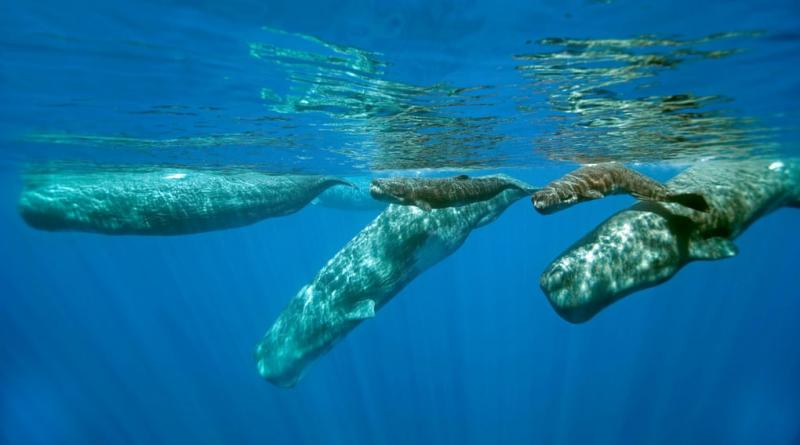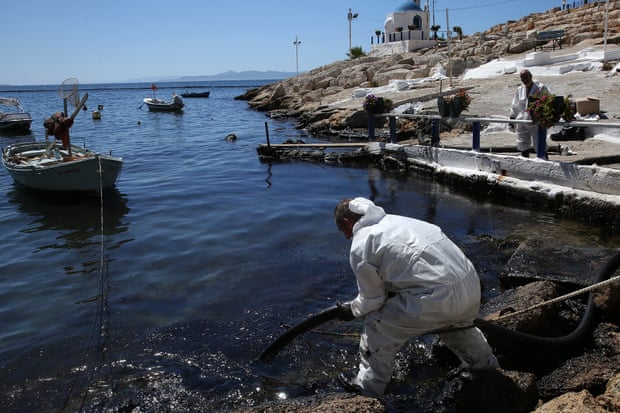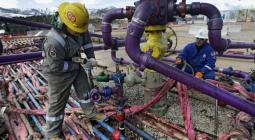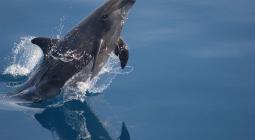'Why replace dolphins with oil drilling?': the battle for Greece's marine life.

Before the giants of oil and gas joined the litany of threats facing Greek sperm whales, the plight of the world’s largest-toothed animal was little known.
Like the Hellenic trench, which was discovered only two decades ago and is the habitat most associated with the species, the mammals were once the preserve of dedicated oceanographers. Now international eco-warriors, bent on stopping oil companies drilling for underwater reserves, are determined to put both the region and its unique species on the map.
At stake is an unusually endangered zone. One of the world’s most significant marine mammal areas, it is home not only to the sperm whale, Greece’s chief predator, but fin whales, Cuvier’s beaked whales, fast-vanishing common dolphins, Mediterranean monk seals and loggerhead sea turtles. All face mortal danger if, as planned, exploration for hydrocarbons is conducted off the country’s western coast.
With worries mounting, WWF Greece and Greenpeace recently went to Athens’ highest administrative court, the council of state, in the hope of getting two oil company concessions annulled in waters off western and south-western Crete. The organisations cited inadequate environmental monitoring, both post- and pre-exploration.
The move follows publication of an unprecedented declaration by 100 of the world’s leading scientists, conservation and ecological groups. The prospective drilling was described in a two-page statement as the death knell for iconic sea mammals already facing manmade threats ranging from ship strikes and plastic pollutants to radar noise from military naval exercises.
“Despite its global import, cetaceans in the Hellenic trench are already facing a series of direct and severe threats,” the signatories opined, calling on leftist prime minister Alexis Tsipras to cancel the offshore activity.
“Oil and gas exploration and exploitation as an additional great threat … would become an important blow to their chances of survival.”
Greece, they said, should instead follow “the bold political and investment decisions” of other EU member states by embracing renewable energy rather than hydrocarbons, one of the biggest drivers of climate change.
The Hellenic trench runs from the north of Corfu in the Ionian Sea to the south of Crete – an area equivalent to 56,000 sq km, nearly twice the size of Belgium.
Since 2012, offshore oil and gas concessions amounting to 72% of the debt-stricken country’s territorial waters have been granted to six companies, four multinational and two Greek. Four onshore concessions have also been handed over. All have been initialled, signed or ratified by successive cash-strapped governments in Athens, with each concession set at 25 years from the moment of exploitation.
But in the race to attract foreign investment, campaigners say the nation long at the centre of the eurozone debt crisis has also cut corners. Blocks handed to the oil industry overlap with critical habitats of marine biodiversity that, according to WWF Greece, are of far-reaching ecological significance.
In the bid to make hydrocarbon extraction one of the main engines of economic recovery, the group claims that established legal protections have been repeatedly rolled back.
“Even in the stages of seismic testing, companies have been exempted from the obligation to conduct environmental impact assessments,” said Dimitris Ibrahim, WWF Greece’s chief Athens-based campaigner. “Instead, they have been allowed to conduct seismic testing in protected areas onland that are designated national parks and Natura 2000 sites.”
At sea, it is feared testing will wreak untold damage on the hearing and orientation of whales, dolphins, turtles and monk seals –mammals especially vulnerable to acoustic signals generated by seismic airguns. Although the oil and gas industry has frequently asserted that seismic research has no detrimental effect, evidence proves otherwise, environmentalists say.
This year, about 50 sea turtles washed up on Israel’s coast, with many either dead or bleeding in what was subsequently attributed by the country’s sea turtle rescue centre to seismic tests in coastal waters rich in oil and gas.
“For so many of our marine mammal population it will literally be the coup de grace if Greece continues with these plans,” said Dr Alexandros Frantzis, an oceanographer who has spent 25 years studying cetaceans in the region.
“For deep-diving sperm whales and Cuvier’s beaked whales, the Hellenic trench is vital for survival,” added Frantzis, who signed the request for Crete and other concessions to be annulled. “For the latter, this is the largest hotspot in the entire Mediterranean Sea, and for sperm whales there is no other breeding and nursing area in the entire Mediterranean.”

As head of Greece’s Pelagos Cetacean Research Institute, Frantzis has done more to reveal the country’s extraordinary underwater diversity than perhaps anyone else alive. Over the years, he has observed ever more mammals meeting untimely deaths.
“Ship-strikes, alone, along the Hellenic tench will likely drive the sperm whale population to extinction if no measures are taken,” he says of a species now believed to number fewer than 300 in Greek waters.
“Pollution by microplastic is already provoking deaths of cetaceans found stranded with stomachs full of plastic.”
Hydrocarbon development will be “the last straw”, he contends.
Exploration could start as early as the end of the year. Spearheading the campaign to stop the drilling plans, WWF, which will soon be raising awareness on Ionian islands including Corfu, Kefalonia, Zakynthos and Ithaka, has been increasingly sounding the alarm. The organisation recently warned of the potentially devastating effect on jobs and money of “an unmanageable, catastrophic oil spill” prompted by the ultra-deep drilling envisaged in coastal areas uniquely dependent on tourism along the Hellenic trench.
At least two of the companies (French multinational Total and US firm ExxonMobil) have been publicly linked with devastating spillages elsewhere.
At a time when other parts of Europe are seeking to promote sustainable economies by progressively banning oil and gas investments, environmental groups say it beggars belief that Greece is keen to develop an industry so clearly on the wane. With its wealth of sun and wind reserves, the country could be leading the charge to develop clean energy.
“At the very moment when the planet is making an unprecedented effort to tackle climate change, here in Greece we choose to lock in our future in search of a fuel whose time has passed,” said Ibrahim. “It’s hugely ironic given the country’s tremendous potential, and when all available data indicates that renewable energy generates more jobs per dollar invested compared with oil drilling.”

Describing the quest to tap hydrocarbons as Greece’s biggest emerging threat – to the environment, economy and local communities – Ibrahim, like Frantzis, insists the fight is now on. And, they add, they will give it their all as they take on the world’s biggest oil companies. Protests in affected areas are also being stepped up.
“We have to give it our all, because if we lose this there will be no way back,” said Frantzis. “For oil companies, the treasure may lie below the sea bottom and still even that is uncertain. For Greeks, our marine environment is our natural heritage, a source of income for millions who depend on tourism. Why would we want to replace dolphins that have existed since antiquity with oil platforms and tankers?”
7 June 2019
THE GUARDIAN



